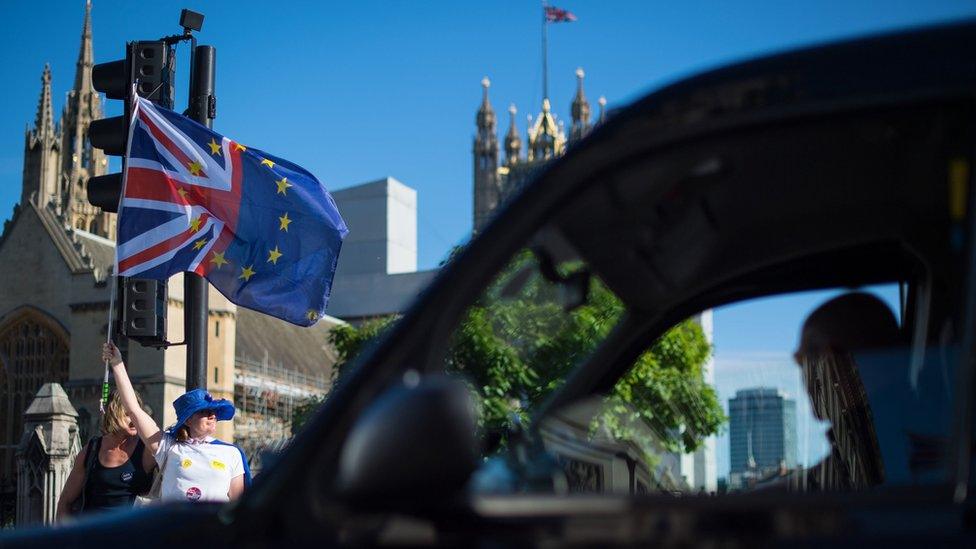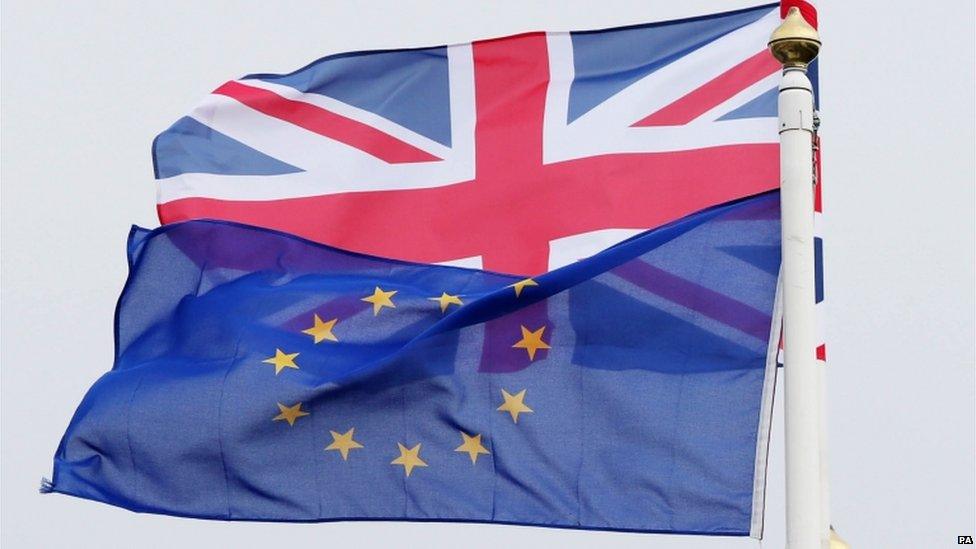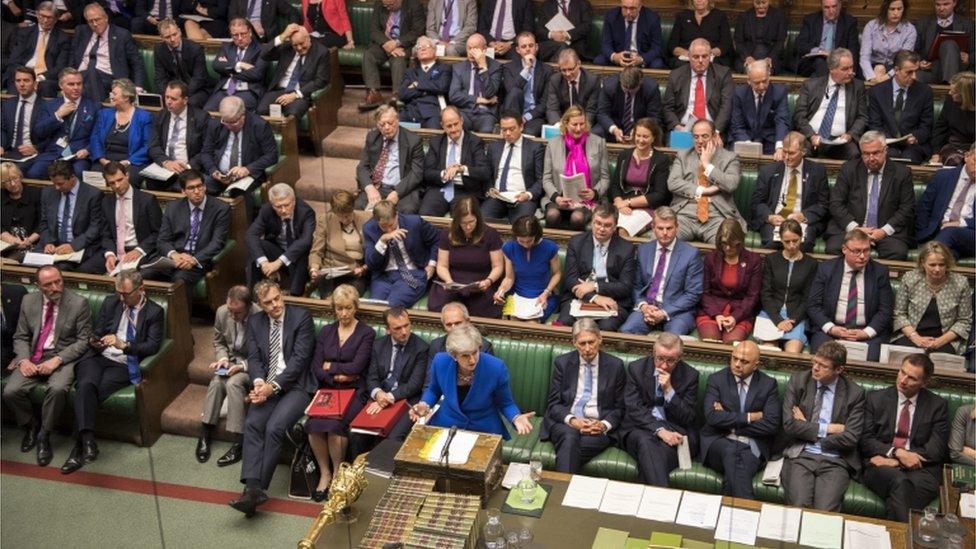Week ahead in Parliament
- Published
- comments

It's back to Brexit, after a seasonal break, where, I suspect, for many parliamentarians the plotting resumed at some point on Boxing Day.
This week should see the results of all the holiday intriguing - as I write it does not look as if there has been any softening of Conservative or DUP opposition to the PM's Brexit deal.
So is the central policy of the government heading for a heavy defeat?
One product of all the seasonal scheming is an amendment to the Finance Bill from a pretty stellar cast of senior backbenchers, headed by Home Affairs Committee Chair, Yvette Cooper; former Labour deputy leader, Harriet Harman; Conservative former Education Secretary Nicky Morgan; policy guru Sir Oliver Letwin, and roving proponent of the Norway option, Nick Boles.
Their amendment aims to prevent the government implementing a "no deal" Brexit without the explicit consent of Parliament.
It would only allow powers to amend the tax code to deal with the ramifications of the leaving the EU to come into effect in certain circumstances: first, if the Commons has approved a negotiated withdrawal agreement and a framework for the future relationship; second, if the government has sought an extension of the Article 50 period; or third, if MPs had approved a no-deal Brexit.
Beyond that, watch out for amendments to Brexit bills - there are quite a few for the various Brexit factions to target; the Fisheries Bill and the Agriculture Bill are both due for report stage in the Commons and that could produce changes ministers would not welcome, for example a new clause requiring primary legislation for any extension to a Brexit transitional period (an entirely possible development).
There's also the Trade Bill, languishing in Lords limbo since its second reading last September.
The government needs all of these measures and more (an immigration bill, for sure) on the statute book pretty rapidly.
And then there's the resumption of the "meaningful vote" debate - look out for choreographed changes of position by big names, in prime time interviews or big op-Ed articles, or some smoke signals from Brussels which might influence the balance of opinion. New refined versions of the amendments being proposed from all quarters will doubtless emerge, as well.
To be honest, everything else is secondary to the Brexit debate. There are all kinds of debates and committee hearings on all kinds of issues - but at the moment Brexit trumps all other cards.
Here's my rundown of the week ahead - but beware, it's all subject to change without notice.
Monday 7 January
The Commons reconvenes (2.30pm) for Work and Pensions Questions, followed, no doubt, by the usual fusillade of post-holiday urgent questions and ministerial statements. Something from Home Secretary Sajid Javid on the migrants attempting to cross the Channel already looks likely, as well there might be one on the 10 year plan for the NHS.
But the most intriguing possibility is yet another Brexit deal update from the PM, perhaps announcing some new understanding or assurances, aimed at defusing objections on the Conservative or DUP benches.
The main debate is on Westminster's bullying scandal - and the now-open hostility between the government front bench and Speaker Bercow can be expected to resume.
Remember, Mr Speaker endured a torrid time after the last PMQs of 2018, when Tory MPs accused the Labour leader of calling Theresa May a "stupid woman".
The ensuing points of order saw open accusations that the Speaker was biased against the Conservatives, breaching a long-standing Commons taboo, and that was followed by some biting criticisms of the way he runs Chamber business, including the suggestion that he should not chair this debate, given there are live bullying allegations against him, personally. The Speaker is now under fire as never before - just days, perhaps, before he will have to deliver some of the most significant rulings in decades, on the forthcoming "meaningful vote" on the PM's Brexit deal.
Speaker Bercow to Andrea Leadsom: Do me the courtesy of listening
Formally the debate is on the Committee on Standards report on the implications of the Dame Laura Cox report for the future of the House's standards system.
The report proposes to boost the voting rights of the lay members (ie non-MPs) on the committee and guarantee the independence of the Standards Commissioner, who investigates allegations against MPs. In particular, the report says that the requirement for the Commissioner to seek permission before investigating allegations on events more than seven years ago is "an unacceptable incursion" on the independence of the Commissioner. The report makes clear that its recommendations at far from a complete response to the bullying and sexual harassment allegations that have beset Westminster - and are a first step towards addressing the problem.
Then comes a debate chosen by the Backbench Business Committee on Children's social care in England - led by former Children's Minister Tim Loughton It will bring together a series of reports from local government, children's charities and the All Party Parliamentary Group on Children, raising concerns about the shortfall of funding in children's social care, and the resulting severe deterioration in early intervention and prevention services.
The adjournment is on the interim report of the United Nations Special Rapporteur on extreme poverty and human rights on the UK - led by Labour's Emma Lewell-Buck
In Westminster Hall, the Petitions Committee has scheduled a debate (4.30pm) on e-petition 228572 which calls for the creation of an independent commission on televised election debates.
In the Lords (2.30pm) questions to ministers range across combustible cladding in blocks of flats and the government's proposed timetable for the passage of all remaining legislation required for Brexit.
The main legislative event is the second reading debate on the Offensive Weapons Bill.
Tuesday 8 January
Business, Energy and Industrial Strategy Questions open Commons business (11.30am) and the post holiday statements and urgent questions may spread into Tuesday as well....
The day's Ten Minute Rule Bill, from Labour's Dame Louise Ellman is a controversial one, in internal Labour Party terms - her International Development Assistance (Palestinian National Authority Schools) would prohibit funding to schools operated by the Palestinian National Authority that do not promote values endorsed by the UNESCO.

The main legislation is the report and third reading of the Finance (No. 3) Bill - apart from the Yvette Cooper amendment (see above) there is a variation on the same theme from a cross party group including Labour's Chris Leslie and Chuka Umunna, plus Conservatives Anna Soubry and Heidi Allen.
Then there is a series of official Labour amendments calling for reviews of the impact of various parts of the bill - notably the effect of changes to the basic rate limit and personal allowance on child poverty and equality. The SNP are proposing a new clause to ensure that payments to employees to meet the costs of applications for settled status, following withdrawal after Brexit, would not be subject to income tax.
The Lib Dems, Plaid Cymru and the Green MP Caroline Lucas have an interesting proposal; that income tax and corporation tax would only be authorised if Parliament had taken a decision on Brexit - agreeing a deal, or revoking the decision to leave or holding a referendum, or postponing Brexit day.
In Westminster Hall debates include early diagnosis and the cancer workforce in the NHS long-term plan (9.30am) and apprenticeships and skills policy (2.30pm). Labour MP Judith Cummins will be discussing problems with the apprenticeship levy raised by local businesses and education providers, and arguing that the current apprenticeship and skills system disproportionately benefits London and the South East.
In the Lords (2.30pm), the main event is the detailed committee stage scrutiny of the Financial Services (Implementation of Legislation) Bill - a Brexit bill which will provide the government with powers to implement and make changes to 'in flight' files of EU financial services legislation.
The powers will last for two years after UK withdrawal from the EU, in the event of a 'no-deal' scenario. Issues are not normally pushed to a vote at this stage, but the latest suite of amendments suggests that peers may want to add additional safeguards to the powers the bill would give to ministers.
That is followed by a short debate on supporting adolescent girls in fragile and conflict-affected countries.
Wednesday 9 January
MPs warm up for later events with half an hour of International Development questions (11.30am) before what promises to be a particularly tense session of Prime Minister's Questions.

The PM will be under pressure as debate on her Brexit deal resumes, Jeremy Corbyn will face the fallout from the previous session (anyone care to bet some helpful Conservative will have a question about workplace misogyny?) and so will Speaker Bercow, whose authority was openly challenged.
The Ten Minute Rule Bill from the Conservative and former Army officer, Leo Docherty, would seek to ensure that the UK sought derogation from international human rights law, when it deployed troops abroad, to avoid them being taken to the international court, later on.
Then MPs resume their "meaningful vote" debate on the PM's Brexit deal - first comes a business motion setting out the structure for the rest of the debate. The conclusion and votes on the amendments (to be selected by the Speaker on the final day) and the main motion will be held the following week.
Theresa May announces Brexit vote date
The adjournment debate, led by Plymouth Labour MP Luke Pollard, is on basing arrangements for the Royal Marines, continuing his campaign to maintain a strong services presence in the city.
My committee pick is the joint Treasury/Work and Pensions hearing on Motability in the wake of their report criticising unacceptable levels of executive pay and the £2.4bn surplus it has built up. The witnesses are Comptroller and Auditor General Amyas Morse (the Government wastefinder general) and Motability founder Lord Sterling.
And it will be worth keeping an eye on the Scottish Affairs hearing on the Fisheries Bill (3pm) with Fisheries Minister George Eustice MP. This is a critical issue for a number of Scottish constituencies, and may be a matter of survival for a number of Scottish Conservatives.
In Westminster Hall, the opening debate (9.30am) is on diabetes - former minister Sir John Hayes wants to highlight the steps that can be taken to tackle what he calls a "national plague" with 3.8 million people diagnosed with diabetes, plus an estimated further people who are undiagnosed.
Labour's Emma Reynolds leads a debate on bailiff regulatory reform (2.30 pm). In November, she described in the Commons how a disabled woman constituent barricaded herself in her bathroom and called police after seeing rogue bailiffs hold her husband in a headlock.
Labour MP Jo Platt has a debate on social mobility in the North West (4pm). Statistics show her Leigh constituency is at the bottom of a table of all 533 in England in early years rankings. She wants to highlight local disadvantage and its impact on the life chances of young people.
Finally, at 4.30 pm, the Conservative former Culture Secretary, John Whittingdale leads a debate on International protection of journalists. It follows up the latest figures from Reporters Sans Frontiers worldwide roundup, external of journalists killed, detained, held hostage or missing in 2018. This found that 80 journalists were killed, 348 were in prison, and 60 were being held hostage. It is also a priority for the Foreign Office.
In the Lords (3pm) questions to ministers include Labour's Lord Rooker continuing his campaign on the mandatory fortification of flour with folic acid to prevent foetal abnormalities.
Then peers continue their debate on the Brexit deal (aka the meaning-less vote - their debate simply notes the terms of the deal, and they don't share MPs' right to reject or amend).
There is a revised Labour amendment to the motion, though, slightly toned down from its original version in order to attract cross-party support. The amendment from Labour leader, Baroness Smith of Basildon, notes that the final decision lies with the Commons, but says that a no deal Brexit "must be emphatically rejected, and regrets that withdrawal from the EU on the terms set out in the Withdrawal Agreement and Political Declaration laid before Parliament would damage the future economic prosperity, internal security and global influence of the United Kingdom."
Thursday 10 January
MPs open (9.30am) with an hour of Transport questions, before moving on to Business questions to the Leader of the House, and then another day of Meaningful Vote debate.
In Westminster Hall (1.30pm) Labour's Lisa Nandy leads a debate on the franchising of Crown Post Offices and the effect on high streets and local communities.
In the Lords (11am) questions to ministers include Labour's Lord Jordan on ensuring new properties are designed to avoid accidents. Then, peers plunge back into their Brexit deal debate.
Friday 11 January
Rather unusually, the Leader of the Commons has signalled that MPs might sit, to continue the meaningful vote debate. Or it might not.
If the sitting goes ahead, MPs will meet at 9.30am and launch straight into the debate, without the hour of questions to ministers that normally opens their day...
The Lords will not be sitting.